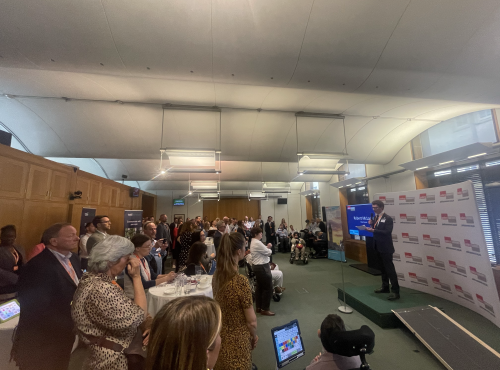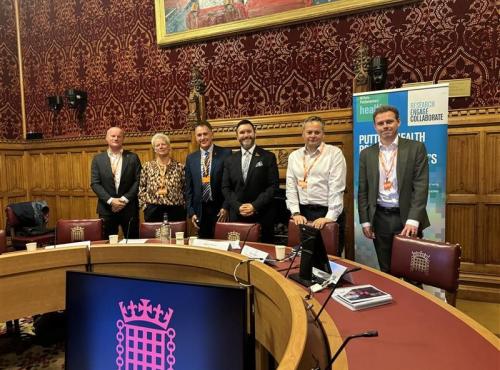The Weary Titan? Policy Connect at Conservative Party Conference 2018
One of the most all-encompassing debates in British municipal politics is which conurbation can hold claim to the title of ‘England’s Second City’. Whilst there are occasional interlopers in this debate from the likes of Leeds, Liverpool and Newcastle – the main contenders are invariably Manchester and Birmingham. Either by accident or design, the Conservative Party has attempted to bridge this divide by alternating between the two cities as the host for their annual conference.
As a Yorkshireman – I’m very much on the fence about whether to support Manchester as fellow Northerners, or to back Birmingham on the grounds thanks to a still lingering resentment over the Wars of the Roses. Often, it is the ancestral folk memory that wins out.
Regardless, it is always a pleasure to be in Birmingham. After decades of playing second fiddle to Manchester, it is a city that has a new-found confidence. A development boom that began with the arrival of the Selfridges Building in 2003 has transformed the city centre. The long-maligned New Street Station has been rebuilt from the ground-up, the Paradise redevelopment has torn down the brutalist maze that surrounded the Council Chambers, whilst the under-construction extension of the West Midlands Metro to Edgbaston has finally started to see this running-joke of a tram system finally playing a key role in what has historically been a car-focused urban environment.
A downside of all this construction, sadly, has been the imposition of a labyrinth of hoardings to protect pedestrians from various diggers, bulldozers and pneumatic drills. It also – as more than a few journalists noted – meant that the ICC was surrounded by even more security than usual, creating a rather unfortunate juxtaposition with the Conservative Party’s chosen slogan for the conference. There were, quite literally, barriers to ‘Opportunity’.
Still, after last year’s post-election reckoning in Manchester, which had the atmosphere of a wake and famously cumulated in the Prime Minister’s keynote speech being overshadowed by a coughing fit and the backdrop literally disintegrating, it would have taken quite a large effort for things to have been any worse. In this respect, the Conservative Party will be quite pleased with how things went.
Over my three days at Conference, I had the pleasure of being on three panel discussions, launching one report, and drinking a great deal of terrible wine and bad sandwiches (for any neophyte to the strange world of the party conference – it is vital that one brings along a supply of fruit to augment what will be a terrible diet) as well as catching up with the great and the good.
On Monday morning, I was hosted by the law firm DLA Piper for a panel discussion on Brexit and the manufacturing sector. I spoke alongside a number of leading figures from across the sector, together with the former EU Legal Advisor to Parliament, Paul Hardy, and the senior Conservative Peer, Lord Leigh of Hurley. The luxury of speaking last always allows you to take the best parts of what other people have said and pass it off as your own, but that was the only element of ‘Cherry Picking’ I see as being allowed within the current Brexit negotiations. I confess that closing my remarks with “in the long run, we are all dead” may not have been the best way of kick-starting three days of political discussions, but it did sum up my general view that the economic risks of leaving the European Union are minor in contrast to the long-term impact of the Fourth Industrial Revolution and the rise of automation.
Moving across Victoria Square, it was a pleasure to launch our paper on design skills and the UK’s industrial strategy. I am very grateful to everyone who helped to bring it together, especially our friends at the Design and Technology Association and the Design Business Association. Many thanks also to the Birmingham Museum and Art Gallery for hosting and for allowing to get reacquainted with one of my favourite sculptures, Sir Jacob Epstein’s Lucifer. Two panel discussions brought together representatives from the school, university and business sectors. There was a clear consensus from the audience that embedding design thinking in the curriculum is vital in ensuring that students and workers of tomorrow are able to embrace the challenges and opportunities that the changing nature of work presents.
My final engagement – an event discussion hosted by PLMR on connectivity – allowed me to engage my inner transport nerd and look at how a design-centred approach to infrastructure planning is vital to how we develop clean, sustainable transit.
Party Conferences are unusual things. Behind the secure zone and airport-style baggage checks, ideas and discussions flow far more freely than they do in Westminster, almost like a company away day. I attended as many of the fringe events as possible, with a few highlights being:
- Liz Truss calling for the Motorway speed limit to be increased to 80 mph
- Dominic Raab accusing people of “politicising” the Northern Ireland border issue (something I felt had been the case since Edward Carson, but perhaps that’s just me)
- Chris Grayling being asked if he was a “plane, train or automobile” guy and not saying train despite literally being at an event hosted by the Rail Delivery Group
- The BBC hosting a straw poll on people’s preferred Brexit deal by handing out cupcakes with Norway, Canada, Chequers and the WTO on them
- A reception with the EEF where the Chancellor said that he was looking forward to getting something from business “…um, I mean ideas, not raising Corporation Tax!”
- A personal favourite – of course – is the Associated British Ports reception – the annual celebration of sparkling wine, fish and chips, and sea shanties, always puts me in a good mood
Your correspondent also managed to get into the Sky Party by reasons unknown. I shall refrain from divulging too many details. I also understand that elsewhere in the ICC, the Sun Party included delights such as the “Frictionless Border”, “DExEU on the Beach”, “Chequers Taxi” and “Interginerational Fairness.”
A reception by the up-and-coming liberal conservative think-tank Onward was also well received in the wonderful book rotunda of the Library of Birmingham.
In 1902, Joseph Chamberlain - who made his mark as the radical Mayor of Birmingham - gave a speech decrying the gnawing sense of Imperial overstretch and the concern of the British Empire’s hegemony coming to an end. He cited this as “The weary Titan staggers under the too vast orb of its fate”. It is a feeling that I found bubbling under the surface at Conservative Party Conference 2018. A Party that has always prided itself on holding the preeminent role in British political life now faces the twin challenge of Brexit and growing public dissatisfaction with the neo-Liberal status quo.
The contrast between the third-full Symphony Hall playing home to the keynotes by Cabinet Ministers, contrasted with and the rammed fringe events was noteworthy. There is clearly no shortage of young Conservative Party activists (the average age of the attendees didn't seem any different to Labour) all of whom were engaging with radical ideas. After eight years in power, it is obvious that any political party must re-invent itself – with the Prime Ministers (mercifully cough-free) speech pledging an end to austerity and removing the cap on councils borrowing to fund new housing, it may be that the Government is finally getting the message.
Jack Tindale - Manager, APDIG



